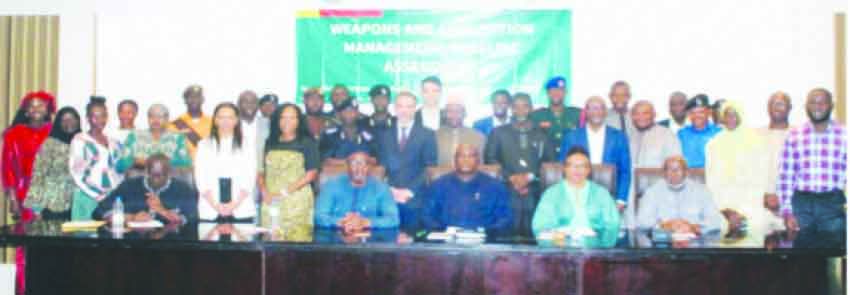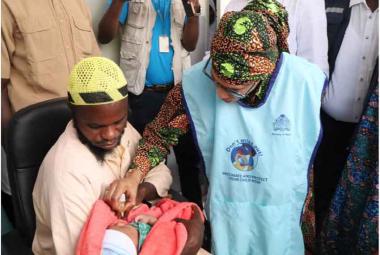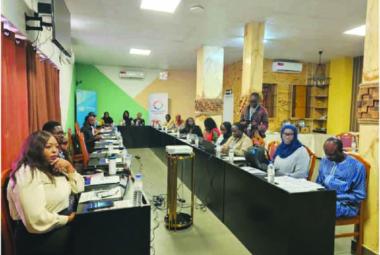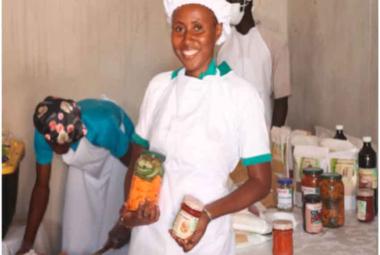Sarjo M. Camara
The Economic Community of West African States (ECOWAS) in collaboration with the Ministry of Interior and National Commission on Small Arm and Light Ammunition (Natcom SALW), recently organised a three-day workshop on National Baseline Assessment of Weapons and Ammunition. The theme of the forum was, ‘Building on existing efforts undertaken by member states and international partners to further develop the governance and management of arms and ammunition’. The objective of the assessment is to provide support to the Government of The Gambia to conduct an assessment of its national framework and capacities, practices and procedures for Weapons and Ammunition Management (WAM). The National Commission on Small Arms and Light Weapons (SALW) provides leadership and oversight concerning arms and ammunition control including general weapon transfers as specified in Article 3-6 of the ECOWAS Convention.
Deputising for the Honourable Minister of Interior, Abdoulie Sanyang, the Minister of Defence, Hon. Sering Modou Njie expressed gratitude to ECOWAS and the United Nations Institute for Disarmament Research (UNIDIR), for their invaluable support and collaboration in organising the baseline assessment. “The baseline assessment aims to provide us all with the evidence and perspective we need to make good and informed decisions towards continuously improving our management of these critical security assets,” he highlighted.
Minister Njie noted that The Gambia government attaches the highest priority to effectively managing weapons and ammunition. “As we are all acutely aware, the illicit proliferation and misuse of conventional arms and their ammunition continues to undermine stability, development, and human rights around the world. Each year, poorly managed weapons and ammunition cost over half a million lives and cause hundreds of billions of dollars in socio-economic damage,” he warned. Mr. Muhamed Coulibaly, a non-resident researcher for the Conventional Arms and Ammunition Programme at UNIDIR, commended The Gambia for being the 11th country that UNIDIR and ECOWAS to have organised a week-long evaluation, which he said aims to bring all national stakeholders in charge of arms and security, together to discuss the weapons and ammunition management capabilities in the country.
He acknowledged the Gambia Government’s efforts in initiating the weapons and ammunition management, stating that the Weapons and Ammunition Management Baseline is a process whereby they determine the level of capacities, process and procedure in terms of weapons and ammunition management. Deputising for the ECOWAS Commissioner for Political Affairs, Peace and Security, Ambassador Abdel Fatu Musa, Her Excellency Mrs Maitta Lilly FRENCH, conveyed appreciation of the ECOWAS Commission to the Government of The Gambia and its people for hosting this pivotal workshop. She emphasised the importance of the assessment and baseline in helping to identify existing capacities and areas of improvement. She said having that will provide options and possible approaches for further strengthening WAM institutions, processes and procedures at the national level.
She equally underscored the relevance of promoting national ownership in enhancing the sustainability of such initiatives. She concluded by commended the UNIDIR for their efforts in supporting capacity-building initiatives and enhancing the technical capacities of member states. Mr. Abubakarr Sulieman Jeng, National Security Adviser, said carrying out a comprehensive baseline assessment of our national framework for managing Weapon and Ammunition is a priority and remains central in their ongoing Security Sector Reforms (SSR) process.
He stressed that a follow-up on the workshop will practically strengthen their national weapons and ammunition management framework. He reiterated The Gambia government’s strong determination to implement the recommendations that have emerged from the baseline assessment. Mr Jeng thanked all the partners and participants for actively engaging in this important endeavour and for sustained partnership. The workshop brought together high-level national authorities, international partners and experts.







